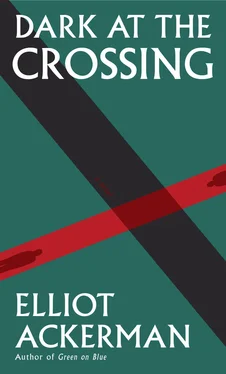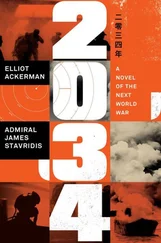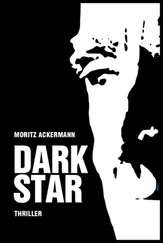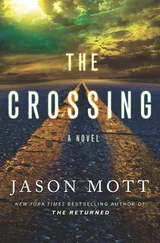Amir depressed the clutch and jabbed the gearshift into reverse. He hooked his arm behind Daphne’s headrest, watching through the rear windshield as he steered. Just before he added some gas, Marty called out:
“Wait!”
“What?” asked Amir.
Marty’s gaze flitted around the cab, as if looking inside for what he wanted to say. “How are you going to talk to Haris and Daphne once they cross?”
Amir paused for a moment. He took the Nokia from his pocket. “They can use Saied’s old phone.” He handed it to Daphne, who tucked it into her coat. Amir again hooked his arm behind her seat, beginning to reverse.
“Daphne,” pleaded Marty.
She turned toward him, but he struggled to put words to whatever he felt. From behind her sunglasses and beneath her hijab, she possessed the distance of miles. “Unless you have something to say, we’re leaving, Marty.”
He was silent.
They reversed down the driveway.
Marty remained in the garden doing nothing, his broad shoulders framed against his enormous house.
They left Antep, driving until the early winter sun hovered near the horizon. It cast afternoon shadows along the gentle sloping hills of Kilis Province. Where the hills spilled into farmland, herded bales of cotton spread across fields, which would remain barren until the next year. Laboring in the fields, farmers cleared and burned the harvest’s stalks. Here and there flames caught wisps of cotton, and the wisps flashed like fireflies in the day. Up ahead, dangling above the smoothly laid macadam, a single traffic light was strung across the D850. It shuffled its colors to an empty road. A wind blew from the north, canting it to the side, so like a weather vane the traffic light indexed south, toward the border.
The road widened. A grass-planted median striped its center. Along its shoulder the yellow-and-white-checkered curb pointed the way toward Kilis, which lifted from the horizon in a mix of stucco Anatolian ramshackle and concrete high-rise. On the near horizon, the tarp hovels of the child refugees hung between the saplings along the D850’s median. As the Peugeot sped toward this intersection, Haris could make out napping, shadowed heaps beneath the tarps. In the front seat, Daphne tightened the knot of her hijab and pressed her sunglasses up her face. Amir downshifted, easing the Peugeot into a low gear. A single boy sat on the curb underneath the traffic light. Hearing the Peugeot’s approach, he stood, gripping the plastic bag of knickknacks Haris had seen before, its bottom bulging in a distorted mass.
The rest of the boys piled from beneath their hovels, fanning out along the shoulder of the road. Haris’s gaze rebounded from face to face, searching for Jamil’s. Amir searched as well. Daphne took off her sunglasses, and Haris noticed she looked at the boys differently, with barely concealed pity, as if they were her boys and that pity was as much for herself as for them.
From a small and isolated lean-to, built behind the rest of the tarps, Jamil strode out among the boys. He stood a head taller than most of them. His hair remained slicked back and reflected the low sun with a signal mirror’s strength. He walked down from the median and onto the road just as Amir parked the Peugeot curbside, below the wavering traffic light.
As Jamil approached, most of the boys kept their distance. But Haris recognized something different from before — a few boys stood in his path, immobile, forcing Jamil to weave his way around them. Their deference was gone. Seeded within the group, a mutiny seemed to have grown.
Amir and Haris stepped from the Peugeot while Daphne remained seated inside. The boys circled around them but maintained a buffer. Just out of earshot, Haris could see them whispering to one another. As he strained to overhear their conversations, he got a better look at Jamil. His left cheek was swollen to a midnight blue, spreading to a raccoon eye, its white stained red. Haris also noticed his hands, a weave of cuts blanketing both knuckles. Jamil had been fighting. Despite his years spent in and around war, Haris couldn’t recall ever being in a fistfight.
Jamil welcomed them back. “I wouldn’t have recognized you,” he said, offering his sly grin and a glimpse of his wide-spaced teeth. He ran his gaze from Haris’s boots to the knit sweater he wore. “You’ve cleaned up well. Taking another try at the border?”
“I wouldn’t have recognized you either,” said Haris, pointing to Jamil’s swollen face, the skin hard and cracked as risen dough.
Both Jamil’s red-stained eye and his untouched white eye bulged wide. He turned to the circle of boys with a hateful look. “Since I saw you last,” he said, lowering his voice, “there’s been some trouble here.”
“What kind of trouble?” asked Amir, his voice a bit too loud.
“If you’ve come for one of your research projects,” said Jamil, “I’ve told you, I don’t offer interviews for free.”
“That’s not why we’re here,” Amir replied.
“Then you are taking another try at the border.”
Jamil looked at Haris, as if he could be counted on to volunteer the truth.
“What kind of trouble?” asked Haris, repeating Amir’s question. He felt the stares of the other boys boring into his back. Slowly, by inches, they constricted their circle around the Peugeot. Haris glanced out into the crowd, searching for a friendly face. He found none and noticed several more boys with blackened eyes and busted knuckles. He remembered Jamil’s gentle companion from before, the one with the glasses missing a lens. Haris struggled for his name, as if speaking it might diffuse the gathering tension.
“Where’s Hamza?” he blurted.
The constricting he felt in the crowd eased, as if awaiting Jamil’s response.
Jamil gazed out toward the other boys. They looked back at him, both wild with the mentality of the pack and contained within it.
Haris realized the threat he felt wasn’t toward him but toward Jamil.
“Hamza left us three nights ago.”
“Is he all right?” asked Amir, seemingly oblivious to the shifting dynamic among the boys.
“He’s fine,” said Jamil. “He’s just not with us anymore.”
“Where is he?” Amir began to pry.
Once again, Jamil cast his eyes over the other, mutinous boys. Giving voice to their divide seemed enough to ensure it could never be bridged. Jamil hesitated a moment, and Haris again felt the pack constrict around them. Jamil must have felt this too, because he began to speak quickly. He explained how three nights before, a group of European relief workers had come to their makeshift encampment offering to take some of the boys north, to a place where the Turkish authorities provided permanent resettlement for Syrians. “Of course they found Hamza of interest,” Jamil said, his voice wavering between contempt and tears. “His glasses and quiet way, anyone would pity him. The van they came in had ten spaces for us. Hamza, who’d always been so frightened I’d leave him, left me at the first chance. When the rest of these boys”—and Jamil spat the word boys into the crowd—“tried to climb inside the van, I told them they couldn’t go and we came to blows. They think we’re waiting at the border for a new home. But that’s not why. We wait here so we might return to our real home.”
As Jamil said this, Haris glanced at the other boys to gauge their response. If home was less a place than an emotion, etched into their faces was forgetfulness. They couldn’t remember what they couldn’t feel. Still, Jamil argued with the crowd as if passing good breath into a blue-lipped corpse.
Making his way forward, the boy who had sat underneath the traffic light pushed through the others and interrupted Jamil. He thrust the plastic bag of knickknacks upward by its handle, holding it toward Haris and Amir like an unpaid bill of sale. The boy stood with mute purpose and an expectant look.
Читать дальше












